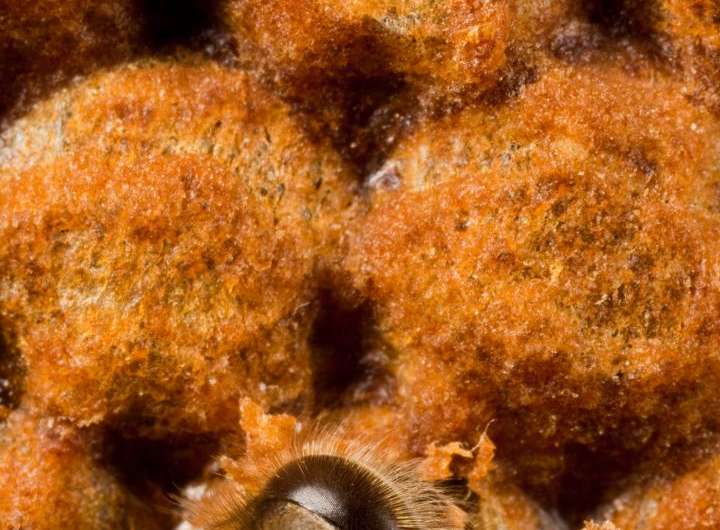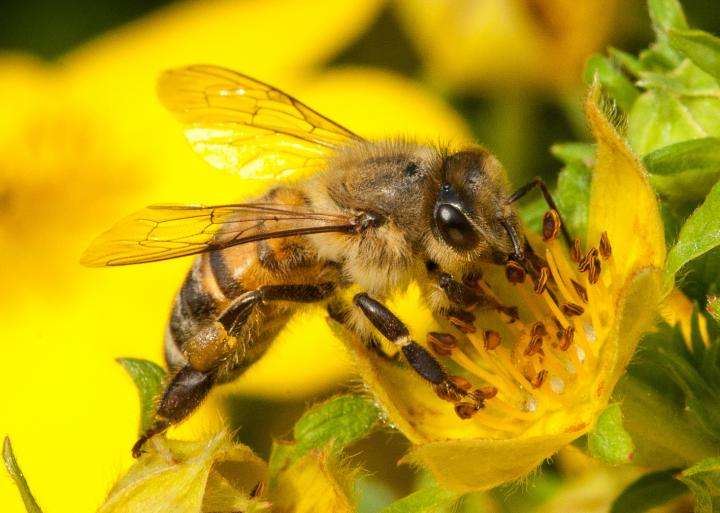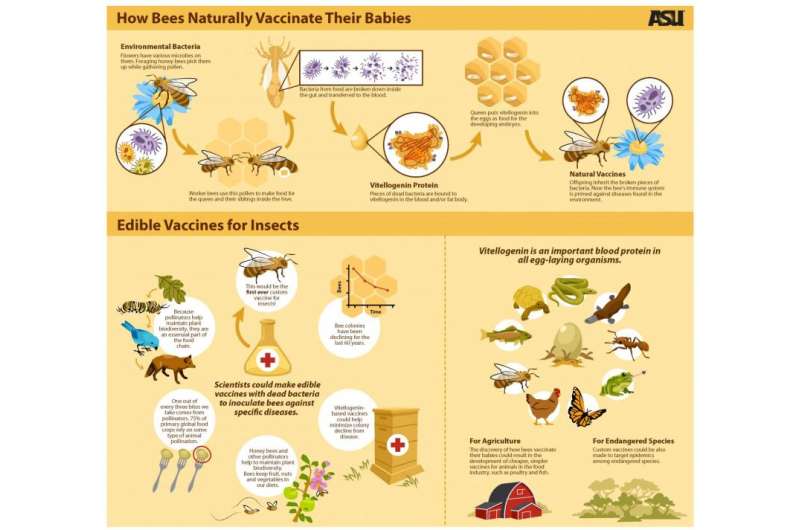How bees naturally vaccinate their babies

When it comes to vaccinating their babies, bees don't have a choice—they naturally immunize their offspring against specific diseases found in their environments. And now for the first time, scientists have discovered how they do it.
Researchers from Arizona State University, University of Helsinki, University of Jyväskylä and Norwegian University of Life Sciences made the discovery after studying a bee blood protein called vitellogenin. The scientists found that this protein plays a critical, but previously unknown role in providing bee babies protection against disease.
The findings appear today in the journal PLOS Pathogens.
"The process by which bees transfer immunity to their babies was a big mystery until now. What we found is that it's as simple as eating," said Gro Amdam, a professor with ASU's School of Life Sciences and co-author of the paper. "Our amazing discovery was made possible because of 15 years of basic research on vitellogenin. This exemplifies how long-term investments in basic research pay off."
Co-author Dalial Freitak, a postdoctoral researcher with University of Helsinki adds: "I have been working on bee immune priming since the start of my doctoral studies. Now almost 10 years later, I feel like I've solved an important part of the puzzle. It's a wonderful and very rewarding feeling!"
How it works
In a honey bee colony, the queen rarely leaves the nest, so worker bees must bring food to her. Forager bees can pick up pathogens in the environment while gathering pollen and nectar. Back in the hive, worker bees use this same pollen to create "royal jelly"—a food made just for the queen that incidentally contains bacteria from the outside environment.
After eating these bacteria, the pathogens are digested in the gut and transferred to the body cavity; there they are stored in the queen's 'fat body'—an organ similar to a liver. Pieces of the bacteria are then bound to vitellogenin—a protein—and carried via blood to the developing eggs. Because of this, bee babies are 'vaccinated' and their immune systems better prepared to fight diseases found in their environment once they are born.
Vitellogenin is the carrier of these immune-priming signals, something researchers did not know until now.

First edible vaccines for bees
While bees vaccinate their babies against some diseases, many pathogens are deadly and the insects are unable to fight them.
But now that Amdam and Freitak understand how bees vaccinate their babies, this opens the door to creating the first edible and natural vaccine for insects.
"We are patenting a way to produce a harmless vaccine, as well as how to cultivate the vaccines and introduce them to bee hives through a cocktail the bees would eat. They would then be able to stave off disease," said Freitak.
One destructive disease that affects bees is American Foul Brood, which spreads quickly and destroys hives. The bacterium infects bee larvae as they ingest food contaminated with its spores. These spores get their nourishment from the larvae, eventually killing them.
This disease is just one example where the researchers say a vaccine would be extremely beneficial.
Why this discovery is important to humans
It's widely known that pollinators, including bees, are facing serious environmental dangers.

During the past six decades, managed honey bee colonies in the United States have declined from 6 million in 1947 to only 2.5 million today. Not only are bees affected by diseases, they have been decimated by a phenomenon called colony collapse disorder. Researchers don't know exactly what causes this, but pesticides, pests, pathogens and nutrition problems may all be contributing factors.
According to a 2014 report by the U.S. government, pollinators are instrumental for a healthy economy and critical to food security, contributing 35 percent of global food production. In North America, insects pollinate 87 of the top 115 food crops and honey bees are vital in keeping fruits, nuts and vegetables in our diets.
Humans depend on bees and other pollinating insects for a huge portion of their food supply. Insect vaccines could play an important role in helping to combat colony collapse disorder, in addition to fighting a variety of diseases.
All egg-laying species have vitellogenin
This discovery could have far-reaching benefits for other species, as well as substantial, positive impacts on food production. All egg-laying species including fish, poultry, reptiles, amphibians and insects have vitellogenin in their bodies.
The food industry could implement the use of natural vaccines that would not only be inexpensive to produce, they could easily be used in developing countries.
"Because this vaccination process is naturally occurring, this process would be cheap and ultimately simple to implement. It has the potential to both improve and secure food production for humans," said Amdam.
Journal information: PLoS Pathogens
Provided by Arizona State University



















